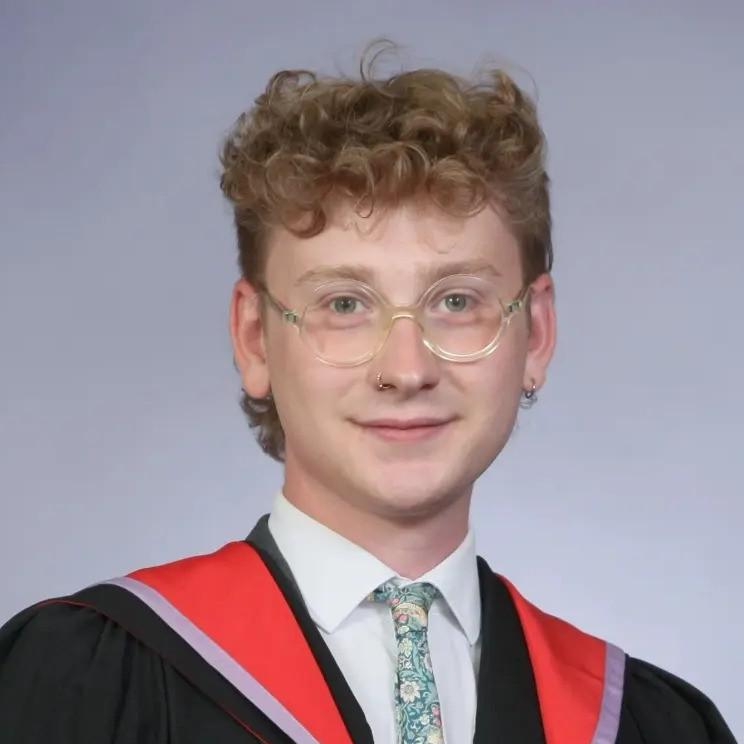Staff profile
Ted O'Hare
Research Postgraduate - Computational Mechanics Node
MEng (Hons) AFHEA

| Affiliation | Telephone |
|---|---|
| Research Postgraduate - Computational Mechanics Node in the Department of Engineering |
Biography
Ted (he/they) is a PhD student in computational mechanics in the Department of Engineering. He graduated with an MEng degree in Civil Engineering from Durham in 2021 before continuing his studies into a PhD with a departmental/EPSRC studentship. His undergraduate final year project, completed under the supervision of Professor Charles Augarde, focused on developing an engineer's guide to the Virtual Element Method, a recently developed numerical technique for polytopal meshes.
Research Project
Classical continuum mechanics formulations are unable to capture localised material failure. This is because they do not include any information about the length scale (such as information on the crystalline structure or grain size) of a material. Therefore when modelling problems involving localised failure (such as concentrated shear failure which is typical in failure of geotechnical structures, such as landslide events) using numerical analysis techniques, such as the finite element method, the failure zone does not converge to a finite size with mesh refinement. This means that the failure load is pathologically dependent on the mesh size and alignment and it will not converge towards a steady value. To overcome this problem, higher-order or non-local continuum theories such as micropolar (or Cosserat) theory may be used, which utilise information about the material length scale.
Ted's research project, which is supervised by Professor Will Coombs, Professor Augarde and Dr Panos Gourgiotis, therefore seeks to implement existing numerical techniques for micropolar continua. By extending Durham-developed Material Point Method (MPM) theory and code, which is ideally suited to problems involving large deformations, Ted hopes to realistically model challenging localisation problems in geotechnics. This is a new and exciting area of research that will open the door to the MPM being used to understand the true nature of failure in geotechnical structures.
Research interests
- Computational solid mechanics
- Continuum mechanics
Publications
Chapter in book
- Forewords: Perspective from a UK University studentO’Hare, T. (2021). Forewords: Perspective from a UK University student. In D. Baker & L. Ellis (Eds.), Libraries, Digital Information, and COVID (p. xix-xxiii). Chandos. https://doi.org/10.1016/b978-0-323-88493-8.00039-2
Conference Paper
- Simulation of strain localisation with an elastoplastic micropolar material point methodO’Hare, T. J., Gourgiotis, P. A., Coombs, W. M., & Augarde, C. E. (2024). Simulation of strain localisation with an elastoplastic micropolar material point method. In W. M. Coombs (Ed.), UKACM Proceedings 2024 (pp. 141-144). UK Association for Computational Mechanics. https://doi.org/10.62512/conf.ukacm2024.009
- A geometrically-exact Finite Element Method for micropolar continua with finite deformationsO’Hare, T. J., Gourgiotis, P. A., Coombs, W. M., & Augarde, C. E. (2023, April 19 – 2023, April 21). A geometrically-exact Finite Element Method for micropolar continua with finite deformations [Conference paper]. Presented at UKACM 2023, University of Warwick, Coventry, UK.
- The Virtual Element Method for EngineersO’Hare, T., & Augarde, C. (2022, April 20 – 2022, April 22). The Virtual Element Method for Engineers [Conference paper]. Presented at UKACM 2022, Nottingham, England.
Doctoral Thesis
- Localisation in computational geomechanics: a nonlinear micropolar approachO’Hare, T. (2025). Localisation in computational geomechanics: a nonlinear micropolar approach [Thesis]. Durham University. https://etheses.dur.ac.uk/16144/
Journal Article
- An implicit Material Point Method for micropolar solids undergoing large deformationsO’Hare, T., Gourgiotis, P., Coombs, W., & Augarde, C. (2024). An implicit Material Point Method for micropolar solids undergoing large deformations. Computer Methods in Applied Mechanics and Engineering, 419, Article 116668. https://doi.org/10.1016/j.cma.2023.116668
Other (Digital/Visual Media)
- John Varley Roberts: Nine Miscellaneous Organ PiecesBaker, D., & O’Hare, T. (2020). John Varley Roberts: Nine Miscellaneous Organ Pieces [Dataset].
- John Varley Roberts: 18 Introductory Organ VoluntariesBaker, D., & O’Hare, T. (2020). John Varley Roberts: 18 Introductory Organ Voluntaries [Dataset].

